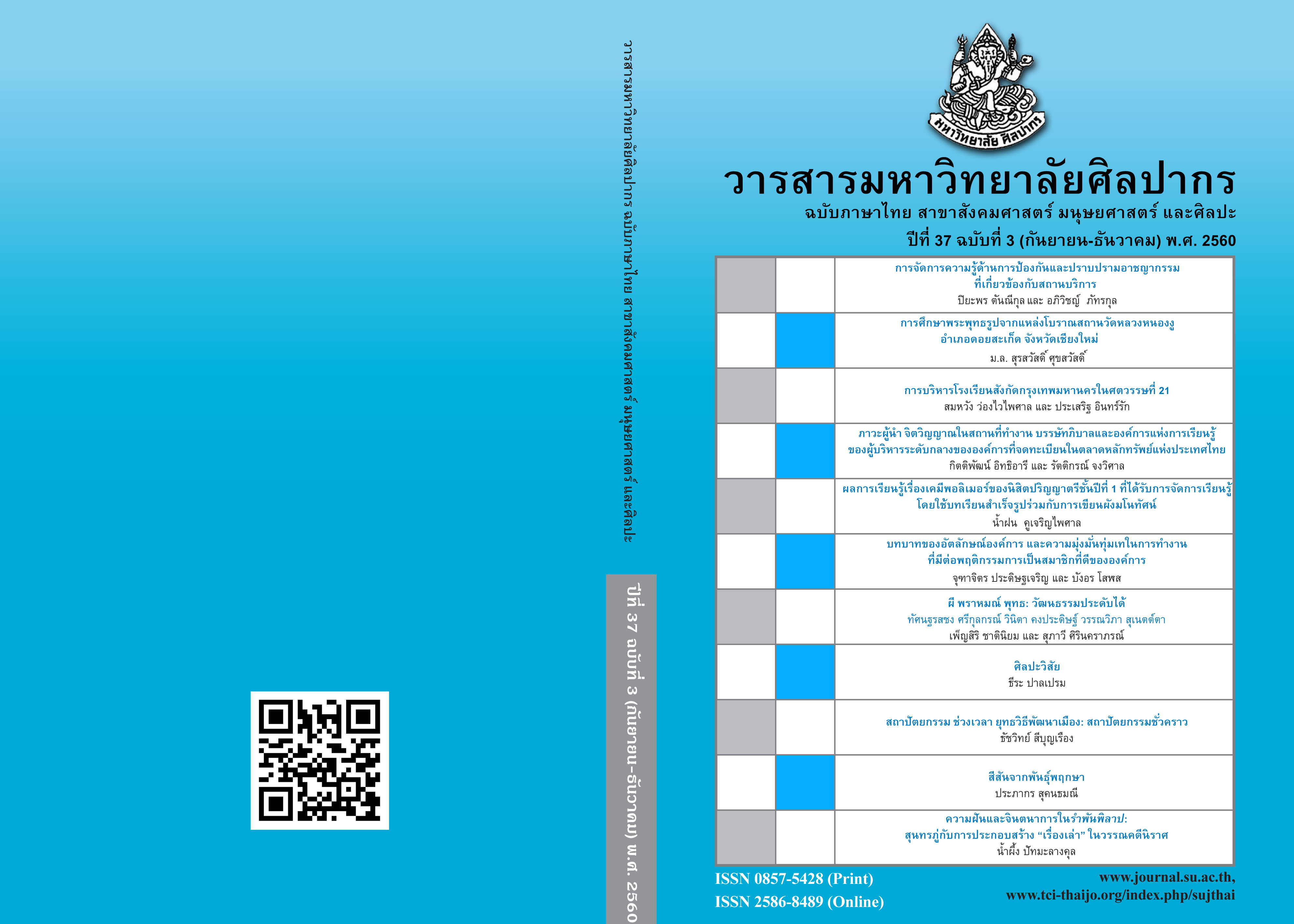บทบาทของอัตลักษณ์องค์การ และความมุ่งมั่นทุ่มเทในการทำงานที่มีต่อพฤติกรรมการเป็นสมาชิกที่ดีขององค์การ (The Role of Employer Branding, and Work Passion in Organizational Citizenship Behavior)
Main Article Content
Abstract
การวิจัยครั้งนี้มีวัตถุประสงค์เพื่อศึกษาบทบาทของอัตลักษณ์องค์การและความมุ่งมั่นทุ่มเทในการทำงานที่มีต่อพฤติกรรมการเป็นสมาชิกที่ดีขององค์การ บนพื้นฐานความสัมพันธ์ระหว่างอัตลักษณ์องค์การ ความมุ่งมั่นทุ่มเทในการทำงาน พฤติกรรมการเป็นสมาชิกที่ดีขององค์การ โดยเก็บรวบรวมข้อมูลจากพนักงานของโรงแรมระดับกลาง (200-300 ห้อง) บนเกาะแห่งหนึ่งทางภาคใต้ของประเทศไทย จำนวน 400 คน ด้วยแบบสอบถาม 4 ฉบับเพื่อตรวจสอบอัตลักษณ์องค์การ ความมุ่งมั่นทุ่มเทในการทำงาน พฤติกรรมการเป็นสมาชิกที่ดีขององค์การ และปัจจัยส่วนบุคคล ผลการวิเคราะห์ข้อมูลพบว่า อัตลักษณ์องค์การมีความสัมพันธ์ทางบวกกับความมุ่งมั่นทุ่มเทในการทำงานและกับพฤติกรรมการเป็นสมาชิกที่ดีขององค์การอย่างมีนัยสำคัญทางสถิติ เช่นเดียวกันความมุ่งมั่นทุ่มเทในการทำงานมีความสัมพันธ์ทางบวกกับพฤติกรรมการเป็นสมาชิกที่ดีขององค์การอย่างมีนัยสำคัญทางสถิติ ผลการวิเคราะห์อำนาจในการทำนายพบว่าอัตลักษณ์องค์การและความมุ่งมั่นทุ่มเทในการทำงานสามารถร่วมกันทำนายพฤติกรรมการเป็นสมาชิกที่ดีขององค์การได้ร้อยละ 49.4 ผลที่พบเสนอแนะได้ว่าองค์การควรเสริมสร้างการรับรู้อัตลักษณ์องค์การของพนักงาน ทั้งด้านสภาพแวดล้อม บรรยากาศ กิจกรรม และการสื่อสารต่างๆ ภายในองค์การ ซึ่งความมุ่งมั่นทุ่มเทในการทำงานจะเพิ่มขึ้นตามไปด้วย และในที่สุดส่งผลทำให้พนักงานมีพฤติกรรมการเป็นสมาชิกที่ดีมากขึ้น
The objectives of this research were to study the role of employer branding and work passion in organizational citizenship behavior based on the relationships among employer branding, work passion, and organizational citizenship behavior. Data were collected from 400 employees of hotels located on an island in southern Thailand, using 4 questionnaires to measure employer branding, work passion, organizational citizenship behavior, and personal factors. Data analysis revealed that employer branding had a significant positive correlation with work passion, and organizational citizenship behavior. Likewise, work passion had a significant positive correlation with organizational citizenship behavior. Multiple regression analysis indicated that the employer branding and work passion could jointly make 49.4 percent predictive power on organizational citizenship behavior. The findings suggest that organization should improve employees’ perception of employer branding, particularly on the dimensions of work environment, atmosphere, activities, and organizational communication. Work passion will then increase, which subsequently helps to induce organizational citizenship behavior.
Downloads
Article Details
References
Barrow, S., & Mosley, R. (2005). The Employer Brand: Bringing the Best of Brand Management to People at Work. Chichester, England: John Wiley & Sons.
Bateman, T. S., &Organ, D. W. (1983). Job Satisfaction and the Good Soldier: The Relationship between Affect and Employee “citizenship”. Academy of Management Journal, 26(4), 587-595.
Bunkumg Saetung, Hotel Director and Owner of Bun-siam hotel and Green Househotel in Krabi. Interview, May 15, 2013 Chester, B. I. (1938). The Functions of the Executive. Cambridge, MA: Harvard University Press.Chiraprapha Tan Akaraborworn. 2011. HR Trands in Thailand 2010-2011. HROD Journal, 3(1), 5-22.
Corporate Leadership Council. (1999). The Employment Brand: Building Competitive Advantage in the Labor Market. Washington, D.C.:Corporate Executive Board.
Gehrels, S. A., & De Looij, J. (2011). Employer Branding: A New Approach for the Hospitality Industry. Research in Hospitality Management, 1(1), 43-52.
Gozukara, I., & Hatipoglu, Z. (2016). The Effect of Employer Branding on Employees’ Organizational Citizenship Behaviors. International Journal of Business Management and Economic Research, 7(1), 477-485.
Hewitt Associates. (2012). Return on Investment in Employer Branding: Collection of Research Data and Case Studies for the Participants of the EB Conference 2012. Retrieved on June 21, 2016, from http://aonhewitt.hu/Plugins/DocumentStore/index.php?view=download&f=61
Honderich, T. (1995). Oxford Companion to Philosophy. New York: Oxford University Press.
Jittalan, N. (2007). Employer Branding สไตล์นิวัตต์ จิตตาลาน. บิสิเนสไทย: 18.
Maslow, A. H. (1943). A Theory of Human Motivation. Psychological Review, 50(4), 370-396.
Minchington, B. (2006). Your Employer Brand: Attract, Engage, Retain.Torrensville SA: Collective Learning Australia.
Mnsade Pracheasilchai. (2012). Quality of Work Life, Psychological, Organizational Socialization, and Employee Passion: A Case Study of Employees in a Private Company (คุณภาพชีวิตในการทำงาน จิตลักษณะ และการถ่ายทอดทางสังคมในองค์การกับความมุ่งมั่นทุ่มเทของพนักงาน: กรณีศึกษาพนักงานบริษัทเอกชนแห่งหนึ่ง). Master’s dissertation, NationalInstitute of Development Administration, Bangkok, Thailand.
Nuttapon Kumlee, Hotel Director and Owner of Varin Beach Resort in Satun. Interview, May 11, 2013.
Organ, D. W. (1988). Organizational Citizenship Behavior: The Good Soldier Syndrome. Lexington, MA: Lexington Books.
Organ, D. W. (1990). The motivational basis of organizational citizenship behavior. In B. M. Staw& L. L. Cummings (Eds.), Research in organizational behavior (pp. 43–72). 12edition, Greenwich, CT: JAI Press
Organ, D. W. (1991). The Applied Psychology of Work Behavior: A Book of Readings. (4th ed.). Homewood, IL: Irwin.
Organ, D. W., Podsakoff, P. M., & MacKenzie, S. B. (2006). Organizational Citizenship Behavior: Its Nature, Antecedents and Consequences. Thousand Oaks: Sage.
Pimonsangsuriya, A. (2012). 2012). Human Resource and ASEAN Economic Community (HR กับประชาคมเศรษฐกิจอาเซียน). Retrieved on June 29, 2013, from http://202.183.190.2/th/knwinf_pcornerdetail.php?pdtlid=1103
Prakran Pantapalangkul. (2012). การสร้าง Employer Brand. Retrieved on January9, 2013, from https://www.l3nr.org/posts/518775
Pramaratad, C. (2007). Employer Branding in the age of independent employee (Employer Branding โลกยุคพนักงาน “เล่นตัว”). Retrieved on June 20, 2013, from IQNewsClip.Prasert Wongna, Hotel Director and Owner of Anandaman Beach Resort in Krabi.Interview, May 14, 2013.
Robinson, K., & Aronica, L. (2009). The Element: How Finding your Passion Changes Everything. New York: The Penguin Group.
Savignano, M. (2007). The Multiple Identities of an Employer: A Case Study on DHL. Master’s dissertation, The European School of Management and Technology, Berlin, Germany.
Schlager, T., Bodderas, M., Maas, P., & Cachelin, J. L. (2011). The Influence of the Employer Brand on Employee Attitudes Relevant for ServiceBranding: An Empirical Investigation. Journal of Services Marketing. 25(7), 497-508.
Smith, C. A., Organ, D. W., & Near, J. P. (1983). Organizational Citizenship Behavior: Its Nature and Antecedents. Journal of Applied Psychology, 68(4), 653-663.
The Ken Blanchard Companies. (2009a). Employee Passion: The New Rules of Engagement. Retrieved on January 10, 2012, from http://www.kenblanchard.com/getattachment/Leading-Research/Research/Employee-Passion-the-New-Rules-of-Engagement/Blanchard-Employee-Passion1.pdf
The Ken Blanchard Companies. (2009b). From Engagement to Work Passion: A Deeper Understanding of the Work Passion Framework. Retrievedon January 10, 2012, from http://www.kenblanchard.com/img/pub/Blanchard_From_Engagement_to_Work_Passion.pdf
Tipwan Mongkhondeeklakul. (2011). The Roles of Organizational Socialization and Psychological Characteristic of Future Orientation and Self Control in Relating to Organizational Commitment and Organizational Citizenship Behavior of Registered Nurses (บทบาทของการถ่ายทอดทางสังคมในองค์การและจิตลักษณะมุ่งอนาคตควบคุมตนที่เกี่ยวข้องกับความผูกพันต่อองค์การ และพฤติกรรมการเป็นสมาชิกที่ดีขององค์การของพยาบาลวิชาชีพ). Master’s dissertation, National Institute of Development Administration, Bangkok, Thailand.
Wattarapon Juntaro, Hotel Director of Phi Phi hotel in Krabi. Interview, May 14, 2013.
Weerapat Juntaro, Hotel Director of Phi Phi hotel in Krabi. Interview, May 14, 2013


